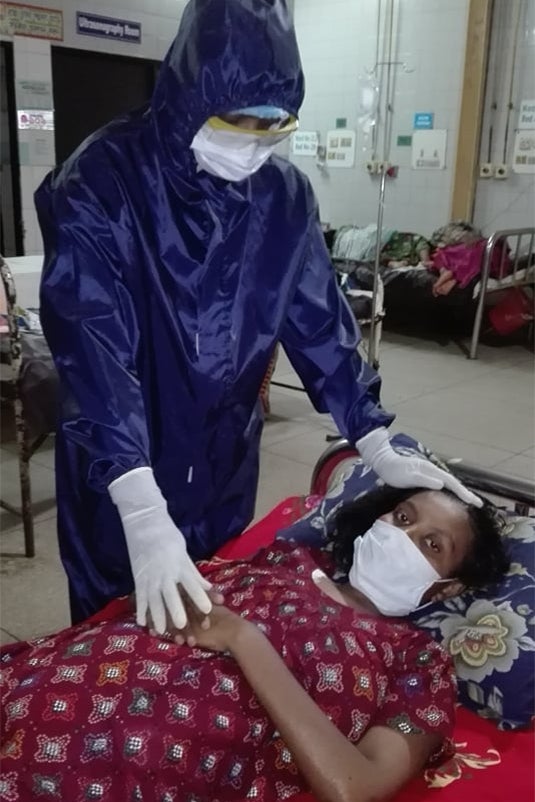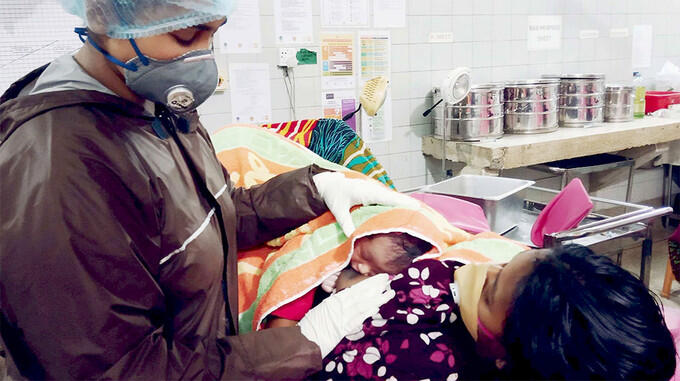DHAKA/MADARIPUR, Bangladesh – Today, there are 164 confirmed cases of COVID-19 in Bangladesh. As the country’s health system races to respond to the pandemic, maternal health experts are concerned about the impact the crisis could have on expectant and new mothers.
Despite progress made in improving maternal health, and efforts to increase institution-based delivery, the country continues to grapple with high rates of maternal mortality. Half of births continue to take place at home, leaving women at serious risk when complications arise. More than 5,000 Bangladeshi women died in pregnancy or childbirth in 2017 alone.
UNFPA-supported midwives are committed to continue their life-saving work, even amid the uncertainties of the pandemic.
Majufa Akter, a midwife in the capital Dhaka, is fortunate to now have the personal protective equipment (PPE) she needs.
But when Sheuly, 25, arrived at the hospital where Majufa works, World Health Organization-compliant PPE supplies had not yet arrived. Sheuly was in dire condition; she had just given birth and was experiencing post-partum haemorrhage, one of the world’s leading causes of maternal death. She needed to be stabilized urgently, with no time for health workers to consider whether she might have COVID-19.
Staff placed a mask on the new mother’s face. Wearing gloves, a mask, goggles, a surgical cap and a raincoat, Majufa bravely attended to Sheuly. With the attending physican, she was able to get the bleeding under control.

In Dhaka, midwife Majufa Akter successfully managed post-partum haemorrage. Image courtesy of Majufa Akter
Before discharging her, Majufa said, “I informed the mother on the systematic prevention of and awareness about COVID-19, such as hand-washing, wearing a mask, social distancing, cleaning, etcetera.”
A few days later, Majufa received PPE. She and her colleagues are grateful for these supplies, which they know are running thin around the world. They continue to care for mothers and newborns, and are trying to raise awareness about infection prevention wherever they can.
“This time is very dangerous, so all of us should be very careful,” she said.
High anxiety with a happy ending
Madaripur was one of the first Bangladeshi districts affected by the pandemic. A lockdown was imposed in the district’s Shibchar area on 19 March, after multiple positive cases of the virus were identified.
Anxiety among health personnel was high when Jabeda arrived at the Madaripur health facility where Selina Akter works as a midwife.
Jabeda was 38 weeks pregnant and already on the verge of delivering. Selina and her colleagues, wearing the gear they had at the time, placed a mask on Jabeda’s face and instructed her to push.
“After a few tries, she delivered a female baby,” Selina said. “Mother’s and baby’s condition was well.”
Despite the pandemic, Selina tried to make the experience as normal as possible for Jabeda and her daughter. She helped them have skin-to-skin contact after the delivery and gently assisted as the new mother breastfed for the first time.
“While considerable gaps remain, Bangladesh has made significant strides in recent years when it comes to maternal health,” noted Rondi Anderson, a midwifery specialist at UNFPA. “The country has introduced a formal degree programme in midwifery, which has already increased the ranks of midwives nationwide.”
Currently, there are more than 1,100 professional midwives working in over 300 health facilities. Since their deployment in 2018, more than 830,000 antenatal care visits have been held and more than 166,000 babies have been delivered, among other critical services provided.
“As midwifery is strengthened, maternal mortality will drop further, making Bangladesh all the more capable of tackling challenges like the COVID-19 pandemic from the perspective of safe pregnancy and childbirth.”
Bumpy road ahead
Both Majufa and Selina work for a UNFPA-supported government maternal health programme. They now have sufficient access to PPE that abides by World Health Organization guidelines, which UNFPA has been able to provide.
Still, there are concerns about running out of these vital supplies as global supply chains are stressed by the pandemic.
UNFPA is supporting the Government’s national- and local-level planning to address these and other COVID-19 concerns, including capacity building on properly using PPE, supporting hospital management to improve patient triage, and raising awareness on COVID-19 prevention and control.
UNFPA is also working to ensure women continue to have access to life-saving sexual and reproductive health services, including safe delivery care.
But there could be a bumpy road ahead, experts warn.
Many of the country’s communities are remotely located or densely populated, particularly in urban areas and displacement camps, making proper social distancing difficult. Running water, needed to properly wash hands, could also be a challenge in the most vulnerable communities.
“Being in one of the most densely populated countries in the world, the challenges of this uncertain situation are unprecedented for both our staff and the people we serve,” said Asa Torkelsson, UNFPA’s representative in Bangladesh.
“It is definitely a challenging moment, but we are in this together, and will continue to strive to ensure that every woman and girl has access to timely and safe sexual and reproductive health services and freedom from gender-based violence, at all times, everywhere.”


